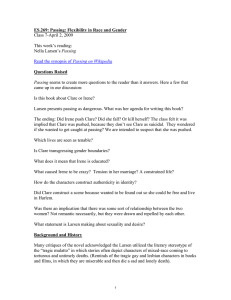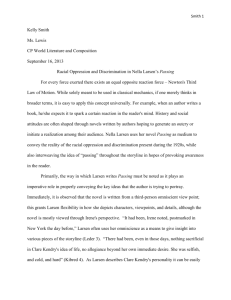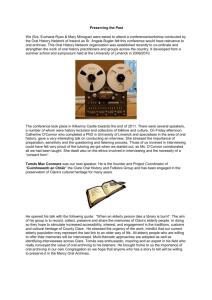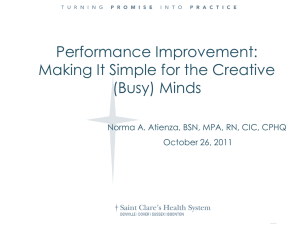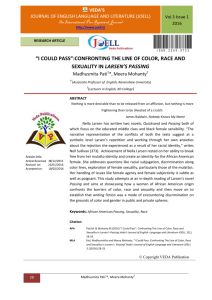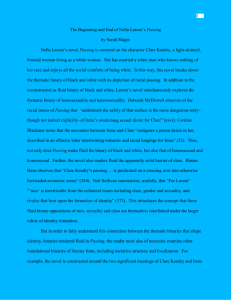File - Allison Carr
advertisement
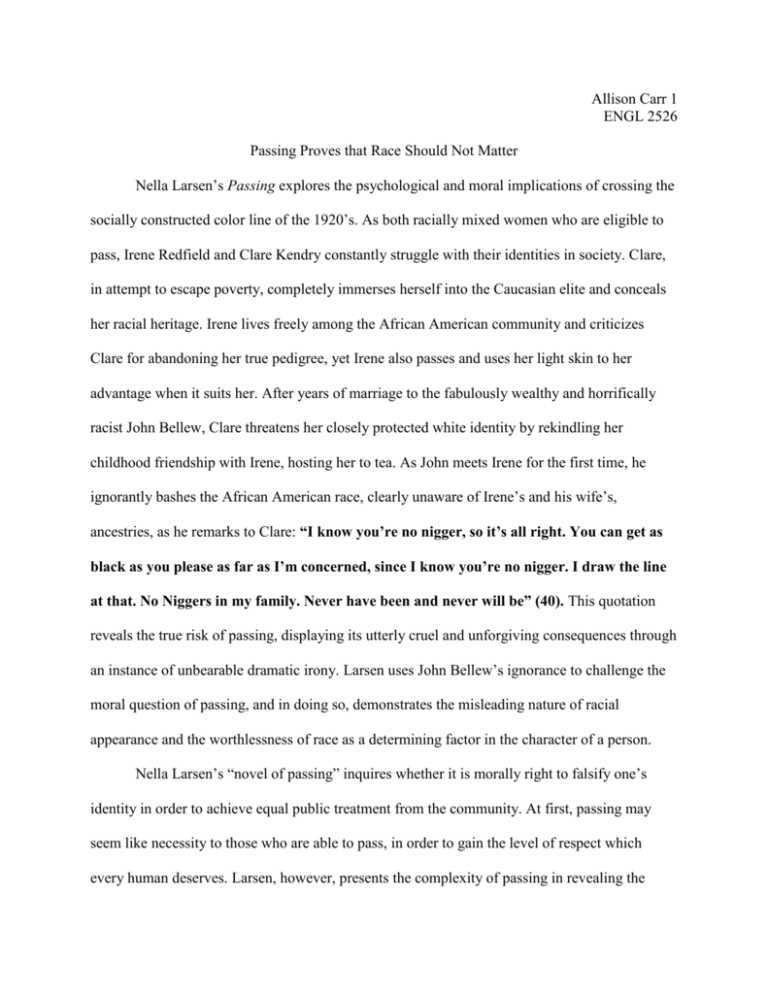
Allison Carr 1 ENGL 2526 Passing Proves that Race Should Not Matter Nella Larsen’s Passing explores the psychological and moral implications of crossing the socially constructed color line of the 1920’s. As both racially mixed women who are eligible to pass, Irene Redfield and Clare Kendry constantly struggle with their identities in society. Clare, in attempt to escape poverty, completely immerses herself into the Caucasian elite and conceals her racial heritage. Irene lives freely among the African American community and criticizes Clare for abandoning her true pedigree, yet Irene also passes and uses her light skin to her advantage when it suits her. After years of marriage to the fabulously wealthy and horrifically racist John Bellew, Clare threatens her closely protected white identity by rekindling her childhood friendship with Irene, hosting her to tea. As John meets Irene for the first time, he ignorantly bashes the African American race, clearly unaware of Irene’s and his wife’s, ancestries, as he remarks to Clare: “I know you’re no nigger, so it’s all right. You can get as black as you please as far as I’m concerned, since I know you’re no nigger. I draw the line at that. No Niggers in my family. Never have been and never will be” (40). This quotation reveals the true risk of passing, displaying its utterly cruel and unforgiving consequences through an instance of unbearable dramatic irony. Larsen uses John Bellew’s ignorance to challenge the moral question of passing, and in doing so, demonstrates the misleading nature of racial appearance and the worthlessness of race as a determining factor in the character of a person. Nella Larsen’s “novel of passing” inquires whether it is morally right to falsify one’s identity in order to achieve equal public treatment from the community. At first, passing may seem like necessity to those who are able to pass, in order to gain the level of respect which every human deserves. Larsen, however, presents the complexity of passing in revealing the Carr 2 emotion of Clare’s husband. John clearly maintains an unwavering “No niggers in my family” standard for his lineage. Larsen presents his unwavering racism as distasteful and morally skewed. At the same time, however, she skillfully makes the point that John has the right to raise a family with whatever beliefs he may hold, without regard to whether or not they are honorable. Through Bellew’s rant, Larsen poses the ultimate question—if John Bellew truly loves his wife as he claims, does her heritage truly matter, or does he have the right to know the true lineage of his wife? Bellew clearly holds the importance of race as a high priority, for he “draws the line” with a no-negro policy, and he even tells Clare she can “get as dark as [she] pleases”, as long as she does not have any African American blood. This remark resonates with agonizing irony, as Bellew says that Clare can even appear African American (which would be the only way he could identify her race), as long as she actually is not; in reality she does not appear African American and actually is. John Bellew falls in love with Clare, who appears white, for her light skin masks her African American heritage. He assumes that she is Caucasian. Therefore, his feelings for Clare show that appearance provides racial identity. If one’s appearance does not afford any ethnic clues, and that person is still attractive to those of other races, then race and heritage do not matter in terms of who we consider as life partners. Clare and John’s relationship underscores the meaninglessness of racial stereotypes that cause people to try to pass in the first place. The fact that an extreme racist such as Bellew is unaware of his wife’s Negro descent, contributes profoundly to this narrative of passing. His ignorance, and passing in general undermine any argument supporting racist beliefs. In the story, African Americans with Carr 3 Caucasian appearances have the ability to assimilate into white culture without the knowledge of racist whites. Therefore, the act of passing itself proves all racist judgments as invalid, for without physical attributes to signify one’s heritage, racism would seize to exist. Further research of the psychological effects of skin color and ethnicity on people’s judgments hopefully reveals some moral progress within our culture since the 1920s.
